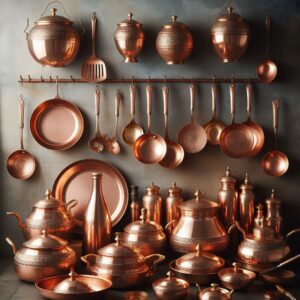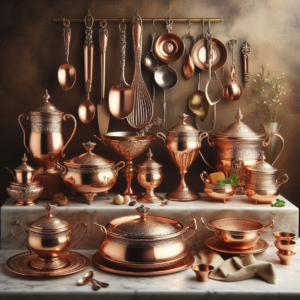World Copper water bottles have emerged as a popular choice for those seeking a blend of style and potential health benefits in their hydration routine. These bottles, crafted from copper, have captured the attention of wellness enthusiasts and health-conscious individuals alike. With claims of improved digestion, enhanced immunity, and environmental sustainability, Premium copper bottles have gained a significant following in recent years.
Amidst their rising popularity, it’s essential to delve into the topic with a critical eye, understanding both the perceived benefits and potential risks associated with using copper water bottles. While they offer promise in terms of antimicrobial properties and Ayurvedic-inspired health benefits, it’s crucial to navigate the discussion with an awareness of the need for balanced consideration of the possible drawbacks. Let’s explore further into the realm of copper water bottles to uncover the truth behind their allure and the importance of understanding their full spectrum of implications.
The Science Behind Copper
Copper water bottles have gained popularity due to their unique properties and potential health benefits.
Here are some key points to consider:
- Eco-Friendly Material: Copper is a natural resource that can be recycled, making it an eco-conscious choice. Unlike plastic or disposable Copper water bottles, copper bottles contribute less to environmental pollution.
- Antimicrobial Properties: Copper has inherent antimicrobial properties. It can help inhibit the growth of harmful bacteria, viruses, and fungi. This makes copper water bottles a hygienic option for storing water.
- Ayurvedic Tradition: Ayurveda, the ancient Indian system of medicine, recommends drinking water stored in copper vessels. According to Ayurvedic principles, copper-infused water can balance the three doshas (Vata, Pitta, and Kapha) and promote overall well-being.
- Improved Digestion: Some proponents believe that drinking water from copper bottles can aid digestion by stimulating the production of digestive enzymes. It is also said to help detoxify the liver and kidneys.
- Joint Health: Copper is essential for collagen formation, which is crucial for maintaining healthy joints. Regular consumption of copper water may support joint health.
- Elegance and Aesthetics: Copper water bottles often feature intricate designs and a rustic charm. They make stylish accessories while serving a functional purpose.
Copper: A Vital Nutrient
World of Premium Copper Bottles is an essential mineral that plays several crucial roles in maintaining overall well-being. Here are some key aspects of copper’s contribution to human health:
- Blood Cell Formation:
- Copper, along with iron, enables the body to produce red blood cells. These cells transport oxygen throughout the body, ensuring proper oxygenation of tissues and organs.
- Bone Health:
- Copper is essential for bone strength. It contributes to the formation of collagen, a protein that makes up bone tissue.
- Adequate copper levels are associated with healthy bones and may help prevent conditions like osteoporosis.
- Cardiovascular Health:
- The role of copper in heart health is somewhat controversial, with mixed research results.
- Some studies suggest that copper deficiency may be linked to heart-related issues, including heart disease.
- Copper may influence cholesterol levels, affecting both total cholesterol and low-density lipoprotein (LDL) cholesterol. However, further research is needed to establish clear connections.
- Immune Function:
- Copper is involved in immune system function. It supports the body’s defense mechanisms against infections and diseases.
- Collagen Synthesis:
- Copper is crucial for the production of collagen, which is essential for skin, connective tissues, and wound healing.
- Pigmentation:
- Copper works alongside a pigment called melanin to color our hair, skin, and eyes.
Antimicrobial Properties and Historical Use
- Antimicrobial Properties:
- Copper exhibits natural antimicrobial properties. It can kill or inhibit the growth of bacteria, viruses, and fungi.
- This property has led to the use of copper in various applications, such as copper-infused fabrics, hospital surfaces, and even doorknobs.
- Historical Significance:
- Throughout history, copper has been used for various purposes:
- Ancient Egyptians used copper vessels for water purification.
- Copper was employed in Ayurvedic medicine for its healing properties.
- Copper bracelets were believed to alleviate joint pain and inflammation.
- Throughout history, copper has been used for various purposes:
Essential Trace Element
- Copper is classified as an essential trace element because our bodies require it in small amounts.
- Since our bodies cannot produce copper, we must obtain it through our diet or supplements.
Balancing Copper Intake
- While copper supplements exist, it’s best to obtain copper through food sources to minimize the risk of imbalances and toxicity.
- A balanced diet rich in foods like nuts, seeds, whole grains, legumes, and dark leafy greens provides sufficient copper.
- Remember that individualized supplementation should be discussed with a healthcare professional, especially if you suspect a copper deficiency.
Health Benefits of Copper Water Bottles
Antibacterial Properties: Inhibiting Bacterial Growth
- Copper, when in contact with water, exhibits natural antimicrobial properties. This property has been recognized for centuries.
- How does it work?
- Copper ions are released into the water, and these ions have the ability to disrupt bacterial cell membranes.
- As a result, bacteria struggle to survive and reproduce, leading to their inhibition.
- Scientific Evidence:
- A study published in the journal Applied and Environmental Microbiology found that copper surfaces effectively reduced the survival of various bacteria, including Escherichia coli (E. coli) and Staphylococcus aureus (S. aureus) .
- While this research primarily focused on solid copper surfaces, the same principles apply to copper water bottles.

2. Boosting Immunity: The Copper-Immune Connection
- Copper plays a role in immune function:
- It is involved in the production of white blood cells, which are essential for fighting infections.
- Copper also supports the activity of enzymes that participate in immune responses.
- Scientific Evidence:
- A review published in the journal Nutrition Reviews highlighted the importance of copper in immune system regulation .
- Adequate copper levels are crucial for maintaining a robust immune defense.
3. Joint Health: Collagen and Copper
- Collagen, a protein abundant in our bodies, is essential for joint health, skin elasticity, and wound healing.
- Copper plays a vital role in collagen synthesis:
- It helps form the cross-links that stabilize collagen fibers.
- These cross-links contribute to the strength and flexibility of connective tissues, including joints.
- Scientific Evidence:
- Research suggests that copper deficiency can lead to impaired collagen formation and joint-related issues .
- Ensuring sufficient copper intake supports overall joint health.
4. Ayurvedic Perspective: Traditional Beliefs
- In Ayurvedic medicine, copper vessels have been used for centuries:
- Tamra jal (copper-infused water) is believed to have various health benefits.
- Ayurvedic practitioners consider copper vessels to be purifying and capable of balancing the body’s doshas (energies).
- While traditional beliefs lack rigorous scientific validation, they highlight the cultural significance of copper.
Choosing the Right Copper Water Bottle
- Quality: Opt for Food-Grade Copper
- Food-grade copper ensures that the copper bottle is safe for storing water and won’t leach harmful substances.
- Look for bottles made from high-quality copper that meets safety standards.
- Avoid bottles with impurities or questionable sourcing.
- Lining: Pure Copper vs. Coated
- Pure Copper Bottles:
- These bottles are made entirely of copper without any additional lining.
- They offer the full benefits of copper, including its antimicrobial properties.
- However, pure copper can react with water and develop a patina over time.
- Coated Copper Bottles:
- These bottles have an inner lining made of materials like stainless steel or nickel.
- The lining prevents direct contact between water and copper.
- Coated bottles maintain the aesthetic appeal of copper while minimizing any taste changes.
- Consider your preference for taste, maintenance, and potential patina when choosing between pure and coated options.
- Pure Copper Bottles:
- Design and Durability: Aesthetic and Functional Aspects
- Aesthetic Design:
- Copper water bottles come in various designs, from sleek and minimalist to intricately engraved.
- Choose a design that resonates with your personal style.
- Functionality:
- Look for features like a leak-proof cap, easy-to-hold shape, and a wide mouth for easy cleaning and filling.
- Consider whether the bottle fits in your bag or backpack for on-the-go use.
- Durability matters, especially if you plan to use the bottle daily.
- Aesthetic Design:
- Eco-Friendly Aspect: Highlight Copper as a Sustainable Choice
- Emphasize the sustainability of copper:
- Copper is a renewable resource that can be recycled indefinitely.
- Unlike plastic bottles, copper doesn’t contribute to plastic waste.
- By choosing copper, you’re making an eco-friendly choice.
- Emphasize the sustainability of copper:
Conclusion
World of Premium Copper Bottles have become a trendy accessory, seen everywhere from yoga studios to boardrooms. Touted for their health benefits like improved digestion and natural purification, these traditional vessels are enjoying a modern surge in popularity. But before you jump on the bandwagon, it’s important to consider both the potential upsides and downsides. This article will explore the world of copper water bottles, helping you decide if they’re the right fit for your hydration needs.
In the realm of health-conscious hydration, The Amrit Life’s Best copper water bottles stand out. Explore the benefits, stay informed about precautions, and embrace wellness with every sip!











